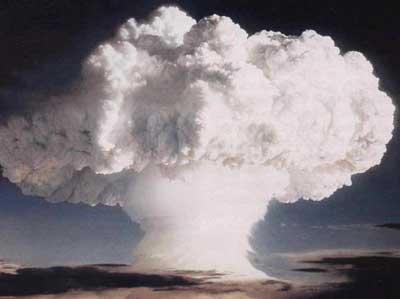Iran So Far Away, Part 9

The time to strike Iran's growing nuclear infrasturcture is now, or at least soon. I argued last year that we should let the diplomatic instrument of power play itself out; play bad cop to the EU's good cop. That has proven fruitless. Reuel Marc Gerecht, writing in the Weekly Standard, has a very thoughtful treatment of a subject I have been thinking much about in my capacity as a professional strategist and planner for the last few months.
You'd best believe the military is already thinking of ways to make a strike work, and while our Army and Marine Corps are tied up pretty tightly in Iraq right now, they don't really enter into this picture. This will be a job for the Air Force and the Navy -- striking a relative handful of fixed (some hardened) facilities, no more than about a thousand desired points of impact (DPIs) is not a job for ground troops in any event and a ground invasion of Iran is an absolute -- and unnecessary -- absurdity.
As to the reservation RMG mentions: they are serious, but hardly insrumoutable -- or even salient really, in the larger context of what it would mean for Iran to have weaponized nukes. I am certain there will be sites we don't get, but building atomic and/or thermonuclear weapons requires a substantial industrial infrastructure, unlike bio weapons that can be produced in a kitchen or a van, and are not easily disguised by dual uses, like chemical facilities. Many will be hardened, but we've come a very long way -- much farther than the public commonly knows -- toward defeating this problem with conventional weapons. And Iran's relatively primitive and fragile air defense and power systems guarantee that they cannot stop us from doing what we will. Even if we get only a portion of Iran's infrastructure, however, we are certain to set their program back by years, much as Israel's attack on the Osirak facility in 1981 set back Saddam Hussein's bomb-making program.
The Iranian people will doubtless be angered, but support of the Mullahs' regime is not strong now; a strike might as easily incite unrest at home. The Euroweenies will predictably go nuts, but who cares what they think anyway? Iran doubtless will retaliate, perhaps even with conventional forces. So bring it on. They could hardly be doing much more in Iraq and at some point Shiite meddling there will run afoul of the largely sunni-led insurgency. Let the two fight it out, as they're destined to do at some point anyway. The press already tells us there's a civil war in Iraq. It isn't guaranteed that such a war won't ultimately play in our favor (if we keep out of it); the Iran-Iraq War led to huge problems domestically for both Saddam and the Mullahs. The hornets are already flying around and we're spraying them. Perhaps it's time now to go after the nest.
And after that, nuke Saudi Arabia......
BG Jack D. Ripper
Does bombing the Islamic Republic's nuclear facilities make sense? What are the downsides of such action? Do the negatives outweigh the good that would come from the demolition of Iran's facilities? The repercussions from an American strike, inside Iran and out, would surely be massive. The French are certainly right: The diplomatic process, no matter how hard the Europeans and the Americans may try, is coming to a close. Unless the Iranians prove more helpful than they have been since the election of Ahmadinejad and, as important, since the highly intelligent and tough former Revolutionary Guard commander Ali Ardeshir Larijani assumed responsibility for the nuclear portfolio in August 2005, it will take a near miracle to keep the diplomatic dialogue going on this subject for more than another twelve months.
ALTHOUGH THE BUSH ADMINISTRATION has no desire to have the Great Iran Debate--just mentioning a preventive military strike at the State Department or the Pentagon is not a socially acceptable, polite thing to do--the clerical regime will probably force the administration to have it soon. The recent reporting that suggests the Bush administration--or at least the dark side of it in the Pentagon and the vice president's office--is already gearing up for a possible military confrontation with the clerics is, to put it mildly, at odds with the diplomacy-centered, keep-the-handcuffs-on-hawkish-U.N.-ambassador-John-Bolton approach of the State Department, which dominates Iran policy. Although this may change, the Pentagon and the vice president's office seem to have little role in the administration's Iran discussions, and in neither place do you find bombing enthusiasts or strategists trying to game scenarios reminiscent of the run-up to the 2003 war against Saddam Hussein.
In any case, whether Abizaid thinks striking is a good or bad idea is irrelevant: Military men are obliged to think about the strategic ramifications of the Islamic Republic's going nuclear. It doesn't take great powers of prognostication to see that the Iran conversation will remain theoretical and easy until that point when the United States really believes that the mullahs are on the verge of obtaining the bomb. From that moment forward, the conversation in Washington, which really hasn't been that serious, will become deadly serious. (No one in the government or out ought to have much confidence in CIA estimates about when Iran will have weapons of mass destruction. The current five to ten-year estimate could die overnight.)
THE REASONS NOT TO BOMB are many, and some are pretty compelling. The thoughtful anti-bomb critics believe such an action is unfeasible (too many possible sites to attack and therefore no guarantee of success without a land invasion), too convulsive (the Iranian people will rise in nationalist indignation; the Europeans and the rest of the "international community" will go ballistic), too dangerous (Iran will unleash a small army of clandestine agents to smite us in Afghanistan and Iraq, ending America's Iraq project and costing numerous American lives in both countries; reborn Persian terrorist holy warriors might strike us everywhere else), and politically unwise (we will silence the Iranians who want change in their country since the nation will rally around the mullahs).
You'd best believe the military is already thinking of ways to make a strike work, and while our Army and Marine Corps are tied up pretty tightly in Iraq right now, they don't really enter into this picture. This will be a job for the Air Force and the Navy -- striking a relative handful of fixed (some hardened) facilities, no more than about a thousand desired points of impact (DPIs) is not a job for ground troops in any event and a ground invasion of Iran is an absolute -- and unnecessary -- absurdity.
As to the reservation RMG mentions: they are serious, but hardly insrumoutable -- or even salient really, in the larger context of what it would mean for Iran to have weaponized nukes. I am certain there will be sites we don't get, but building atomic and/or thermonuclear weapons requires a substantial industrial infrastructure, unlike bio weapons that can be produced in a kitchen or a van, and are not easily disguised by dual uses, like chemical facilities. Many will be hardened, but we've come a very long way -- much farther than the public commonly knows -- toward defeating this problem with conventional weapons. And Iran's relatively primitive and fragile air defense and power systems guarantee that they cannot stop us from doing what we will. Even if we get only a portion of Iran's infrastructure, however, we are certain to set their program back by years, much as Israel's attack on the Osirak facility in 1981 set back Saddam Hussein's bomb-making program.
The Iranian people will doubtless be angered, but support of the Mullahs' regime is not strong now; a strike might as easily incite unrest at home. The Euroweenies will predictably go nuts, but who cares what they think anyway? Iran doubtless will retaliate, perhaps even with conventional forces. So bring it on. They could hardly be doing much more in Iraq and at some point Shiite meddling there will run afoul of the largely sunni-led insurgency. Let the two fight it out, as they're destined to do at some point anyway. The press already tells us there's a civil war in Iraq. It isn't guaranteed that such a war won't ultimately play in our favor (if we keep out of it); the Iran-Iraq War led to huge problems domestically for both Saddam and the Mullahs. The hornets are already flying around and we're spraying them. Perhaps it's time now to go after the nest.
And after that, nuke Saudi Arabia......
BG Jack D. Ripper



